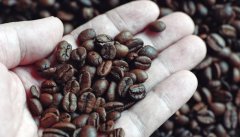A single cup of coffee does not hurt the liver or kidneys, unless. You had fake coffee.

For professional baristas, please follow the coffee workshop (Wechat official account cafe_style)
Traditionally, people have a bad impression of coffee. There have been doubts and criticisms in the news media that coffee can hurt the kidney and liver, and even demanded that coffee should be levied on health taxes compared to tobacco.
Traditionally, people have a bad impression of coffee. There have been doubts and criticisms in the news media that coffee can hurt the kidney and liver, and even demanded that coffee should be levied on health taxes compared to tobacco. But we see foreigners drinking coffee all the time, but they seem to be all right. On the contrary, the incidence of liver and kidney diseases in Taiwan is much higher than that of foreigners. What is the truth?.
Effect of coffee on liver
The liver is home to the metabolism of various substances, including caffeine, so the ability of the liver to process caffeine can reflect the health of the liver. It seems reasonable to infer that coffee may damage the liver. However, according to a variety of research data, we have found the exact opposite.
Many early studies have found that caffeine can reduce the inflammation and damage of the liver if caffeine is given at the same time after the liver is damaged by toxins. In 2005, two important studies in the United States pointed out that drinking coffee can reduce the rate of abnormal liver function, and that people who drink more than two cups of coffee a day will reduce the incidence of chronic liver disease by about 60%, especially patients with alcohol addiction, obesity, diabetes and so on. The reports, published in the most classic International Journal of Gastroenterology in Gastroenterology, represent that mainstream medicine has accepted the idea that coffee can "protect the liver".
Similarly, coffee can also reduce the incidence of liver cancer. In 2007, a comprehensive analysis of ten related studies found that coffee drinkers were about 40 to 50 percent less likely to develop liver cancer than the general population. So, coffee doesn't hurt the liver.
In Taiwan, where chronic hepatitis B is prevalent, the emergence of many coffee shops may be a good thing.
Effect of Coffee on Cancer
Many people once suspected that coffee might be related to cancer, but after scientific verification, it has been found that coffee can reduce the incidence of many cancers.
The University of Toronto has studied nearly 1700 women with the BRCA1 breast cancer risk gene and found that drinking 1 to 3 cups of coffee a day can reduce the risk of breast cancer by 10%. If they drink more than 6 cups a day, the risk of breast cancer can be reduced by about 70%.
A survey in the United States shows that white women who drink coffee every day reduce the incidence of skin cancer by about 10%. If they drink more than six cups of coffee a day, the incidence of skin cancer can be reduced by 30%, while decaffeinated coffee has no such effect.
A study published by Japanese scholars in 2007 pointed out that women who drank more than three cups of coffee a day could reduce the incidence of colorectal cancer by about 60 percent. However, no similar findings were found in men.
A paper published in 2007 by Harvard Medical School in the United States analyzed the data of 13 renal cell cancer studies and found that people who drank more than three cups of coffee a day were about 16 percent less likely to develop renal cell cancer than those who drank no more than one cup a day. Tea has a similar effect: people who drink more than one cup of tea a day are 15% less likely to develop cancer. Other drinks, including milk, fruit juice, soda and so on, do not have this protective effect.
The occurrence of cancer is related to the consequence that cells are stimulated by external stimuli, and then the genes are out of control. Excessive oxidation is a common external stimulation.
It is not known why coffee can inhibit the occurrence of some cancers, or whether it has an effect on more other cancers. However, according to the research report so far, it can be inferred that the key factor in preventing cancer of coffee is its caffeine, and its anticancer effect comes from the antioxidant effect of caffeine. In this way, coffee not only does not hurt the kidney, but also protects the kidney, skin, large intestine and breasts.
Coffee has antioxidant effect.
Human inflammatory reactions undergo a lot of oxidative reactions to remove pathogens and kill infected or cancerous abnormal cells. On the one hand, these oxidative reactions help the human body resist foreign aggression, but also often accidentally harm their own cells. Many diseases are related to these chronic oxidative injuries, especially those related to aging, such as arteriosclerosis, cancer and so on.
The possible harm of coffee
Although coffee seems to have many advantages, we should not ignore the possible disadvantages. We all know that coffee can "hurt the stomach". If people with peptic ulcer disease, they must be careful not to drink too much coffee so as not to get worse. Everyone has a different ability to metabolize coffee, which has something to do with the role of genes. If the metabolism is slow, you can't sleep or your heart beats wildly. Be careful to avoid it. In addition, the author believes that according to the pharmacological effect of coffee on cerebral vasoconstriction, it is best for pregnant women to avoid drinking too much coffee.
For the elderly, drinking too much coffee may also be associated with osteoporosis, but if an appropriate amount of calcium is supplemented, this effect can be ignored. Coffee should not be excessive.
Coffee has been carrying the notoriety of injuring the body, in fact, because of its antioxidant effect, so it has "protect the kidney, protect the liver, strengthen the brain" and so on. But any article as long as excessive may hurt the body, so it is not suitable for excessive drinking, especially children, pregnant women, peptic ulcers, arrhythmias and other individuals with special physique.
The writer is an associate professor of pediatrics in the Medical College of National Taiwan University and a pediatrician in National Taiwan University Hospital
Important Notice :
前街咖啡 FrontStreet Coffee has moved to new addredd:
FrontStreet Coffee Address: 315,Donghua East Road,GuangZhou
Tel:020 38364473
- Prev

Centenarian Coffee worker: the only thought in my life is to make the coffee.
Communication of professional baristas Please pay attention to Coffee Workshop (Wechat official account cafe_style) Coffee originated in Europe and the United States, but after it spread to Japan, the Japanese invested in coffee with unique professional spirit, from bean selection, roasting to brewing, attention to detail, almost demanding, that is, the "coffee" of the staff. Amber Coffee in Ginza, which has been open for 67 years, is a coffee worker.
- Next

Traditional Chinese medicine doctors talk about coffee: Yin deficiency, damp-heat constitution to drink less, taking traditional Chinese medicine should be 2 hours apart.
Professional barista communication Please pay attention to the coffee workshop (Wechat official account cafe_style) full-bodied coffee, which has been renamed by WHO as non-carcinogenic food, but anti-cancer food, what do modern Chinese medicine think? Since coffee is a foreign species and there are no relevant records in ancient books, modern traditional Chinese medicine doctors usually classify traditional Chinese medicine according to the characteristics of traditional Chinese medicine, such as "four qi, five flavors, five colors, meridian tropism".
Related
- Can lightly roasted coffee beans be used to extract espresso? How finely should you grind high-quality coffee beans to make Italian latte?
- What is the difference between the world's top rose summer coffee and Yejia Shefi? What are the flavor characteristics of Yega Shefi coffee and Panama rose summer?
- The ceremony is full! Starbucks starts to cut the ribbon at a complimentary coffee station?!
- A whole Michelin meal?! Lucky launches the new "Small Butter Apple Crispy Latte"
- Three tips for adjusting espresso on rainy days! Quickly find the right water temperature, powder, and grinding ratio for espresso!
- How much hot water does it take to brew hanging ear coffee? How does it taste best? Can hot water from the water dispenser be used to make ear drip coffee?
- What grade does Jamaica Blue Mountain No. 1 coffee belong to and how to drink it better? What is the highest grade of Blue Mountain coffee for coffee aristocrats?
- What are the flavor characteristics of the world-famous coffee Blue Mountain No. 1 Golden Mantelin? What are the characteristics of deep-roasted bitter coffee?
- Can I make coffee a second time in an Italian hand-brewed mocha pot? Why can't coffee be brewed several times like tea leaves?
- Hand-brewed coffee flows with a knife and a tornado. How to brew it? What is the proportion of grinding water and water temperature divided into?

